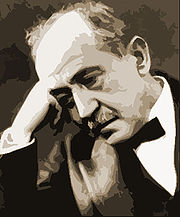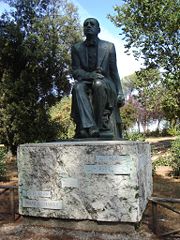
Ahmed Shawqi
Encyclopedia
Ahmed Shawqi was the great Arabic Poet-Laureate, an Egypt
ian poet
and drama
tist who pioneered the modern Egyptian literary movement, most notably introducing the genre of poetic epics to the Arabic literary tradition. On the paternal side he was of Circassian, Greek and Kurdish
descent, and on the maternal side of Turkish
and Greek descent.

 Raised in a privileged setting, his family was prominent and well-connected with the court of the Khedive
Raised in a privileged setting, his family was prominent and well-connected with the court of the Khedive
of Egypt
.
Upon graduating from high school, he attended law school, obtaining a degree in translation
.
Shawqi was then offered a job in the court of the Khedive Abbas II
, which he immediately accepted.
After a year working in the court of the Khedive, Shawqi was sent to continue his studies in Law at the Universities of Montpellier
and Paris
for three years.
While in France
, he was heavily influenced by the works of French playwrights, most notably Molière
and Racine
. He returned to Egypt in 1894, and remained a prominent member of Arab literary culture until the British forced him into exile in southern Spain, Andalusia
, in 1914.
Shawqi remained there until 1920, when he returned to Egypt.
In 1927 he was crowned by his peers Amir al- Sho’araa’ أمير الشعراء(literally: the Prince of Poets) in recognition of his considerable contributions to the literary field.
He used to live in ‘Karmet Ibn Hani’ or Ibn Hani’s Vineyard كرمة ابن هانىء at Al-Matariyyah
area near the palace of the Khedive Abbas II
at Saray El-Qobba until he was exiled. After returning to Egypt he built a new house at Giza which he named the new Karmet Ibn Hani. He met Mohammed Abdel Wahab
, and introduced him for the first time to art, making him his protégé as he gave him a suite in his house. The house later on became Ahmed Shawki Museum
and Mohammed Abdel Wahab
became one of the most famous Egyptian composers.
The first coincides with the period during which he occupied a position at the court of the Khedive, consisting of eulogies to the Khedive: praising him or supporting his policy.
The second comprised the period of his exile in Spain. During this period, his feeling of nostalgia and sense of alienation directed his poetic talent to patriotic poems on Egypt as well as the Arab world.
The third stage occurred after his return from exile: during that period he became preoccupied with the glorious history of Ancient Egypt and Islam. This was the period during which he wrote his religious poems, in praise of the Prophet Muhammad. The maturation of his poetic style was also reflected in his plays, the most notable of which were published during this period.
and two comedies:
in addition to a prose play: the Princess of Andalusia.
A long poem about the History of Islam, named The States of Arabs and the Great Men of Islam.
Egypt
Egypt , officially the Arab Republic of Egypt, Arabic: , is a country mainly in North Africa, with the Sinai Peninsula forming a land bridge in Southwest Asia. Egypt is thus a transcontinental country, and a major power in Africa, the Mediterranean Basin, the Middle East and the Muslim world...
ian poet
Poetry
Poetry is a form of literary art in which language is used for its aesthetic and evocative qualities in addition to, or in lieu of, its apparent meaning...
and drama
Drama
Drama is the specific mode of fiction represented in performance. The term comes from a Greek word meaning "action" , which is derived from "to do","to act" . The enactment of drama in theatre, performed by actors on a stage before an audience, presupposes collaborative modes of production and a...
tist who pioneered the modern Egyptian literary movement, most notably introducing the genre of poetic epics to the Arabic literary tradition. On the paternal side he was of Circassian, Greek and Kurdish
Kurdish people
The Kurdish people, or Kurds , are an Iranian people native to the Middle East, mostly inhabiting a region known as Kurdistan, which includes adjacent parts of Iran, Iraq, Syria, and Turkey...
descent, and on the maternal side of Turkish
Turkish people
Turkish people, also known as the "Turks" , are an ethnic group primarily living in Turkey and in the former lands of the Ottoman Empire where Turkish minorities had been established in Bulgaria, Cyprus, Bosnia and Herzegovina, Georgia, Greece, Kosovo, Macedonia, and Romania...
and Greek descent.
Life


Khedive
The term Khedive is a title largely equivalent to the English word viceroy. It was first used, without official recognition, by Muhammad Ali Pasha , the Wāli of Egypt and Sudan, and vassal of the Ottoman Empire...
of Egypt
Egypt
Egypt , officially the Arab Republic of Egypt, Arabic: , is a country mainly in North Africa, with the Sinai Peninsula forming a land bridge in Southwest Asia. Egypt is thus a transcontinental country, and a major power in Africa, the Mediterranean Basin, the Middle East and the Muslim world...
.
Upon graduating from high school, he attended law school, obtaining a degree in translation
Translation
Translation is the communication of the meaning of a source-language text by means of an equivalent target-language text. Whereas interpreting undoubtedly antedates writing, translation began only after the appearance of written literature; there exist partial translations of the Sumerian Epic of...
.
Shawqi was then offered a job in the court of the Khedive Abbas II
Abbas II of Egypt
HH Abbas II Hilmi Bey was the last Khedive of Egypt and Sudan .-Early life:...
, which he immediately accepted.
After a year working in the court of the Khedive, Shawqi was sent to continue his studies in Law at the Universities of Montpellier
University of Montpellier
The University of Montpellier was a French university in Montpellier in the Languedoc-Roussillon région of the south of France. Its present-day successor universities are the University of Montpellier 1, Montpellier 2 University and Paul Valéry University, Montpellier III.-History:The university...
and Paris
University of Paris
The University of Paris was a university located in Paris, France and one of the earliest to be established in Europe. It was founded in the mid 12th century, and officially recognized as a university probably between 1160 and 1250...
for three years.
While in France
France
The French Republic , The French Republic , The French Republic , (commonly known as France , is a unitary semi-presidential republic in Western Europe with several overseas territories and islands located on other continents and in the Indian, Pacific, and Atlantic oceans. Metropolitan France...
, he was heavily influenced by the works of French playwrights, most notably Molière
Molière
Jean-Baptiste Poquelin, known by his stage name Molière, was a French playwright and actor who is considered to be one of the greatest masters of comedy in Western literature...
and Racine
Jean Racine
Jean Racine , baptismal name Jean-Baptiste Racine , was a French dramatist, one of the "Big Three" of 17th-century France , and one of the most important literary figures in the Western tradition...
. He returned to Egypt in 1894, and remained a prominent member of Arab literary culture until the British forced him into exile in southern Spain, Andalusia
Andalusia
Andalusia is the most populous and the second largest in area of the autonomous communities of Spain. The Andalusian autonomous community is officially recognised as a nationality of Spain. The territory is divided into eight provinces: Huelva, Seville, Cádiz, Córdoba, Málaga, Jaén, Granada and...
, in 1914.
Shawqi remained there until 1920, when he returned to Egypt.
In 1927 he was crowned by his peers Amir al- Sho’araa’ أمير الشعراء(literally: the Prince of Poets) in recognition of his considerable contributions to the literary field.
He used to live in ‘Karmet Ibn Hani’ or Ibn Hani’s Vineyard كرمة ابن هانىء at Al-Matariyyah
Al-Matariyyah
Al-Matariyyah, Mataria or El Matariya is a district in the northern region of Greater Cairo, east of the Nile, in Egypt. The district is unrelated to the El Matareya coastal region in the Dakahlia Governorate...
area near the palace of the Khedive Abbas II
Abbas II of Egypt
HH Abbas II Hilmi Bey was the last Khedive of Egypt and Sudan .-Early life:...
at Saray El-Qobba until he was exiled. After returning to Egypt he built a new house at Giza which he named the new Karmet Ibn Hani. He met Mohammed Abdel Wahab
Mohammed Abdel Wahab
Mohammed Abdel Wahab , also transliterated Mohammed Abd el-Wahaab was a prominent 20th-century Arab Egyptian singer and composer...
, and introduced him for the first time to art, making him his protégé as he gave him a suite in his house. The house later on became Ahmed Shawki Museum
Ahmed Shawki Museum
Ahmed Shawki Museum is a museum is located on the Nile Corniche, Giza part of Cairo, Egypt.The museum is named after and dedicated to the poet and dramatist Ahmed Shawki , who used to live in ‘Karmet Ibn Hani’ or Ibn Hani’s Vineyardin كرمة ابن هانىء at Al-Matariyyah area near the palace of the...
and Mohammed Abdel Wahab
Mohammed Abdel Wahab
Mohammed Abdel Wahab , also transliterated Mohammed Abd el-Wahaab was a prominent 20th-century Arab Egyptian singer and composer...
became one of the most famous Egyptian composers.
Legacy
Shawqi’s work can be categorized into three main periods during his career:The first coincides with the period during which he occupied a position at the court of the Khedive, consisting of eulogies to the Khedive: praising him or supporting his policy.
The second comprised the period of his exile in Spain. During this period, his feeling of nostalgia and sense of alienation directed his poetic talent to patriotic poems on Egypt as well as the Arab world.
The third stage occurred after his return from exile: during that period he became preoccupied with the glorious history of Ancient Egypt and Islam. This was the period during which he wrote his religious poems, in praise of the Prophet Muhammad. The maturation of his poetic style was also reflected in his plays, the most notable of which were published during this period.
Plays
Shawqi was the first in Arabic literature to write poetic plays. He wrote five tragedies:- Magnun Laila (literally "The Madman of Layla"), his first play.
- The Death of Cleopatra
- 'Antara
- Ali bek el-Kabeer
- Qambeez (Cambyses II), 1931
and two comedies:
- Es-Set Huda (literally: Madam Huda)
- El-Bakhila (literally: the Miser)
in addition to a prose play: the Princess of Andalusia.
Poetry
- Esh-Shawqiyyat, his selected works, in four volumes, including Nahj al-Burda, a tribute to the Prophet Muhammad
A long poem about the History of Islam, named The States of Arabs and the Great Men of Islam.
Prose
Shawqi wrote several novels. A few survived. He also wrote chapters of prose, collected under the title: the Markets of Gold.Memory
- His home was turned into Ahmed Shawki MuseumAhmed Shawki MuseumAhmed Shawki Museum is a museum is located on the Nile Corniche, Giza part of Cairo, Egypt.The museum is named after and dedicated to the poet and dramatist Ahmed Shawki , who used to live in ‘Karmet Ibn Hani’ or Ibn Hani’s Vineyardin كرمة ابن هانىء at Al-Matariyyah area near the palace of the...
- The Street of his Home in Giza was named after him.
- Many Statues were erected to honour him inside & outside Egypt.
- Shawqi is celebrated in several parts of the world and in Egypt there is a monthly lecture series about his poetry at the Sawy Culture wheel.
- A Postage stamp was issued in the 1990s in Egypt to honour his memory.
- Google made a doodle for him on selected Arabic-speaking countries on October 16, 2010 in honor of his memory
- Many books were written about his life.

